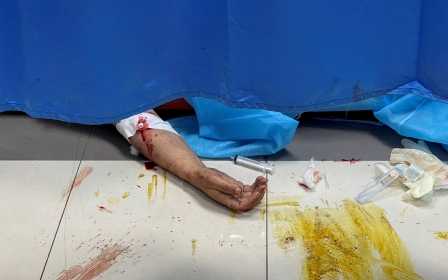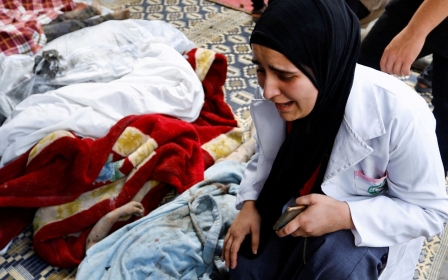Israel-Palestine war: Israel bombs Gaza hospital killing at least 500

The Israeli army bombed a hospital in Gaza City packed with wounded Palestinians and others seeking shelter, killing at least 500 people in what could be the worst atrocity in the conflict so far.
Photos and videos from the al-Ahli Arab Hospital in Gaza City showed fire engulfing the facility's halls, shattered glass and body parts strewn acros the hospital's grounds.
At the time of Tuesday's devastating strike, the Anglican-run hospital was providing treatment and shelter to hundreds of Palestinians wounded and displaced by Israel's 11-day war on the besieged enclave.
Photos and videos obtained by Middle East Eye showed paramedics and residents rushing to tend to the wounded, with scores of children among the casualties. Around them in the grass were blankets, school backpacks and other belongings.
The Palestinian Health Ministry said on its Telegram channel the hospital had received threats from Israel to either clear out or be bombed.
Stay informed with MEE's newsletters
Sign up to get the latest alerts, insights and analysis, starting with Turkey Unpacked
At a press conference later on Tuesday, the ministry said that the hospital was given assurances by the Church of England that it was safe to continue operations. MEE reached out to the Church of England for comment but did not receive a response by time of publication.
Several hospitals in Gaza City have become refuge for people hoping they would be spared from the bombardment after Israel ordered all residents of the city and surrounding areas to move to southern Gaza.
Last week, the Israeli army told several hospitals they had only a few hours to evacuate, warning that if they did not comply they would be bombed.
Doctors Without Borders (MSF), who has repeatedly condemned such warning notices, said it was "horrified" by Tuesday's strike, calling it a "massacre."
"Nothing justifies this shocking attack on a hospital and its many patients and health workers, as well as the people who sought shelter there.
"Hospitals are not a target. This bloodshed must stop. Enough is enough."
Follow Middle East Eye's live coverage for the latest on the Israel-Palestine war
The attack was condemned by Egypt, Jordan, Saudi Arabia, the United Arab Emirates, Lebanon's Hezbollah, Italy, Spain, France, among others.
Canadian Prime Minister Justin Trudeau called it "horrific and absolutely unacceptable".
Turkish President Recep Tayyip Erdogan said hitting a hospital shows the attacker is "devoid of the most basic human values".
Meanwhile, Palestinian-American Congresswoman Rashida Tlaib criticised US President Joe Biden, saying he was also responsible for the deaths of "doctors, children, patients."
"[Biden], this is what happens when you refuse to facilitate a ceasefire and help de-escalate. Your war and destruction only approach has opened my eyes and many Palestinian Americans and Muslim Americans like me. We will remember where you stood," she said.
The Israeli military denied involvement in the blast, saying the explosion caused by misfired Palestinian rocket.
However, Hamas Spokesman Osama Hamdan dismissed the claims, highlighting the severity of the air destruction.
"Everyone knows what Hamas rockets are doing in Israel, in places like Ashkelon and Tel Aviv. There is no destruction like this," Hamdan told Al Jazeera.
"So if someone wants to claim that this is a Palestinian rocket [attack] show us other places where there is destruction like this."
Israel began bombing Gaza on 7 October when Palestinian fighters launched a surprise assault on Israel, which killed more than 1,400 people, according to Israeli officials.
Retaliatory Israeli air strikes have killed more than 3,500 people in 12 days, including more than 1,000 children and 1,000 women. Around one million have been displaced and forced to take shelter in hospitals and schools.
'When will the world stand up for Gaza?'
Mahmoud Bassal, the civil defence spokesperson in Gaza, said the "massacre" left the hospital's floor "covered in dead bodies", with first responders struggling to cope with the high number of wounded.
"It is a pogrom. It is unprecedented throughout the history of the Israeli-Palestinian conflict," Bassal said.
"Gaza is now a big cemetery, what is happening is madness, what happened in Deir Yassin is happening now but worse. Children's limbs are scattered on the ground. When will the world stand up for Gaza?"
Ashraf al-Qudra, the spokesperson of Gaza's health ministry, said hundreds of wounded people remained scattered across the floor outside the hospital.
He added that electricity at Al-Shifa Hospital, where survivors of the bombing were being taken, has run out.
As the extent of the hospital attack began to emerge, calls for confrontations and shootings at Israeli posts spread across the West Bank.
Later, protests flared in various Palestinian cities, as well as in Jordan's capital Amman, against the air strike.
Forces from the Palestinian Authority (PA) used live fire to disperse protesters in Jenin, Ramallah, Bethlehem, Tubas, and other areas.
Meanwhile, shots were fired at illegal Israeli settlements and military checkpoints in Jerusalem, Jenin, and Nablus.
Hussein al-Sheikh, the deputy to the PA President Mahmoud Abbas, echoed Hamas' condemnation. The Ramallah-based administration declared three days of mourning, while its forces continued to disperse protesters across the West Bank.
Middle East Eye delivers independent and unrivalled coverage and analysis of the Middle East, North Africa and beyond. To learn more about republishing this content and the associated fees, please fill out this form. More about MEE can be found here.






